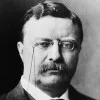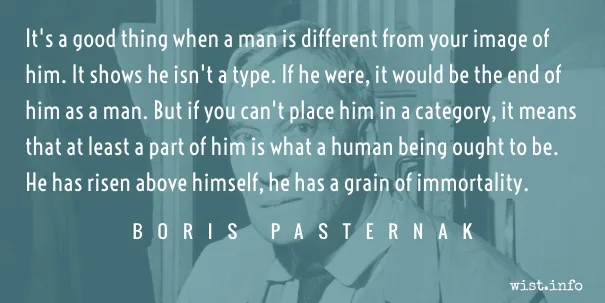Something, some psychological vitamin, is lacking in modern civilization, and as a result we are all more or less subject to this lunacy of believing that whole races or nations are mysteriously good or mysteriously evil.
George Orwell (1903-1950) English writer [pseud. of Eric Arthur Blair]
Essay (1945-04), “Antisemitism in Britain,” Contemporary Jewish Record
(Source)
Written February 1945.
Quotations about:
stereotype
Note not all quotations have been tagged, so Search may find additional quotes on this topic.
After awhile, when accusations are continually and sweepingly made against all men, good and bad, the public as a whole grow to believe that there is a little something bad about the decent man and that there is not much bad about the crook. No greater harm can be done to the body politic than by those men who, through reckless and indiscriminate accusation of good men and bad men, honest men and dishonest men alike, finally so hopelessly puzzle the public that they do not believe that any man in public life is entirely straight; while, on the other hand, they lose all indignation against the man who really is crooked.
Theodore Roosevelt (1858-1919) American politician, statesman, conservationist, writer, US President (1901-1909)
Speech (1910-08-29) “The Nation and the States,” Colorado State Legislature, Denver
(Source)
Collected in Roosevelt, The New Nationalism, Part 1 (1910).
It’s a good thing when a man is different from your image of him. It shows he isn’t a type. If he were, it would be the end of him as a man. But if you can’t place him in a category, it means that at least a part of him is what a human being ought to be. He has risen above himself, he has a grain of immortality.
Boris Pasternak (1890-1960) Russian poet, novelist, and literary translator
Doctor Zhivago [До́ктор Жива́го], Part 2, ch. 9 “Varykino,” sec. 4 [Yuri] (1955) [tr. Hayward & Harari (1958), US ed.]
(Source)
Alternate translations:It’s a good thing when a man is different from your image of him. It shows he isn’t a type. If he were, it would be the end of him as a man. But if you can’t place him in a category, it means that at least a part of him is what a human being ought to be. He has a grain of immortality.
[tr. Hayward & Harari (1958), UK ed.]It’s good when a man deceives your expectations, when he doesn’t correspond to the preconceived notion of him. To belong to a type is the end of a man, his condemnation. If he doesn’t fall under any category, if he’s not representative, half of what’s demanded of him is there. He’s free of himself, he has achieved a grain of immortality.
[tr. Pevear & Volokhonsky (2010)]
The tendency of the casual mind is to pick out or stumble upon a sample which supports or defies its prejudices, and then to make it the representative of a whole class.
Walter Lippmann (1889-1974) American journalist and author
Public Opinion, ch. 10 “The Detection of Stereotypes,” sec. 9 (1922)
(Source)
Categories, if you’ll excuse a brief digression, are a useful way to get a handle on things you don’t understand, as long as you don’t get too attached to them and forget that things like to pop out of one category and into another, and that sometimes the whole category turns itself inside out and becomes something different. It’s useful, for example, to categorize your target as a sorcerer, if he is one; but if you get too attached to your category it’ll leave you embarrassed when he suddenly pulls a knife on you.
By “nationalism” I mean first of all the habit of assuming that human beings can be classified like insects and that whole blocks of millions or tens of millions of people can be confidently labeled “good” or “bad.” But secondly — and this is much more important — I mean the habit of identifying oneself with a single nation or other unit, placing it beyond good and evil and recognizing no other duty than that of advancing its interests.
George Orwell (1903-1950) English writer [pseud. of Eric Arthur Blair]
“Notes on Nationalism” (May 1945)
(Source)






